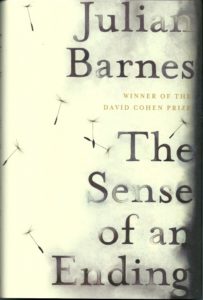Julian Barnes is an English novelist known for his 1989 novel A History of the World in 10 ½ Chapters. Barnes studied at Oxford University, but because of mediocre grades he ended up writing word definitions for the Oxford English Dictionary instead of pursuing academia. He spent three years “in the letters c to g,” researching the histories of words. After several years he became a journalist and then a novelist.
Central to many of Barnes’ novels is the question of how we come to know the past. The title of A History is a play on Sir Walter Raleigh’s The History of the World, but Barnes takes a distinctively subjective, non-linear, and ironic approach to the “serious” subject of history. A wild cast of characters, from woodwoarms to astronauts, narrates very subjective episodes that dance about in time.
But Barnes is not only having fun at the expense of objectivity, the assumed purview of both journalism and history. “To be honest,” he said, “I think I tell less truth when I write journalism than when I write fiction… when you are writing journalism your task is to simplify the world and render it comprehensible in one reading; whereas when you are writing fiction your task is to reflect the fullest complications of the world.”
In 2011 Barnes won the Man Booker Prize for his novel The Sense of an Ending, which deals with the very complicated process of sorting out the truth of our own pasts from the stories that we tell ourselves and others. Early on in the novel the narrator quips to his high-school history teacher, “History is the lies of the victors.” His teacher replies, “It is also the self-delusions of the defeated.”
Imaginative literature, Barnes argued, is “the best way of telling the truth; it’s a process of producing grand, beautiful, well-ordered lies that tell more truth than any assemblage of facts.” And this includes the truths and lies we tell about ourselves.
Julian Barnes must-read:
The Sense of an Ending
(Lansdowne library code: PR 6052 A6657 S45)

